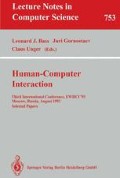Abstract
This paper discusses the problem of integration of hypermedia and Intelligent Learning Environments (ILEs) technologies and the problem of creating an adaptive hypermedia component for ILEs. Our experience of creating an adaptive on-line help facilities for ITEM/IP system is described. This experience forms a background for our hypermedia work and provides some good ideas for it. We also present our approach to integration of a hypermedia component into internal structure of ILE and illustrate it with two examples of adaptive hypermedia components for the most recent versions of our ILEs ISIS-Tutor and ITEM/PG. Finally, we summarize main features of this approach, provide some references to related works, and consider some issues of adaptive hypermedia in general.
Preview
Unable to display preview. Download preview PDF.
References
A. Barr, M. Beard, R.C. Atkinson: The computer as tutorial laboratory: the Stanford BIP project. International Journal on the Man-Machine Studies 8, 567–596 (1975)
P.L. Brusilovsky: Turingal — the language for teaching the principles of programming. In: EUROLOGO 91. Proc. Third European Logo Conference, Parma. Italy, 27–30 August 1991, A.S.I., Parma, pp. 423–432
P.L. Brusilovsky: A framework for intelligent knowledge sequencing and task sequencing. In: C. Frasson, G. Gauthier and G.I. McCalla (eds.): Intelligent Tutoring Systems. Proceedings of the Second International Conference, ITS'92. Berlin: Springer-Verlag 1992, pp. 499–506
P.L. Brusilovsky: Intelligent Tutor, Environment and Manual for Introductory Programming. Educational and Training Technology International 29, 26–34 (1992)
P.L. Brusilovsky: Student as user: Towards an adaptive interface for an intelligent learning environment. Paper accepted to AIED'93 World Conference.
P.L. Brusilovsky, T.B. Gorskaya-Belova: The Environment for Physical Geography Teaching. Computers and Education 18, 85–88 (1992)
P. Brusilovsky, M. Zyryanov: Intelligent learning environment for geography: towards an integration of emerging educational technologies. In: N.Hammond and A.Trapp (eds.): CAL into the Mainstream. CAL 93 Conference Handbook 1993, pp.47–48
V.G. Brusilovsky, P.L. Brusilovsky: The student model in a teaching system for mathematical differentiation. Design and application of PC software in the education process. In: Proc. of the 5-th All-Union Workshop. Moscow: 1989, pp. 23–24 (In Russian)
A.T. Corbett, J.R. Anderson: Student modeling and mastery learning in a computerbased programming tutor. In: C. Frasson, G. Gauthier, G.I. McCalla (eds.): Intelligent Tutoring Systems. Proceedings of the Second International Conference, ITS'92. Berlin: Springer-Verlag 1992
B. de La Passardiere, A. Dufresne: Adaptive navigational tools for educational hypermedia. In: I. Tomek (ed.): Computer Assisted Learning. Proceedings of the 4th International Conference, ICCAL'92. Berlin: Springer-Verlag 1992, pp. 555–567
F. De Rosis, N. De Carolis, S. Pizzutilo: User tailored hypermedia explanations. In: INTERCHI'93 Adjunct Proceedings, Amsterdam, 24–29 April, 1993, pp. 169–170
I.P. Goldstein: The Genetic graph: a representation for the evolution of procedural knowledge. International Journal on the Man-Machine Studies 11, 51–77 (1979)
N. Hammond: Hypermedia and learning: Who guides whom?. In: H. Maurer (ed.): Computer Assisted Learning. Proceedings of the 2-nd International Conference, ICCAL'89. Berlin: Springer-Verlag 1989, pp. 167–181
R.J. Hendley, C.D. Whittington, N. Jurascheck: Hypermedia generation from domain representations. Computers and Education 20, 127–132 (1993)
M.R. Kibby: Intelligent hypermedia for learning. In: R.M. Bottino, P. Forcheri, M.T. Molfino (eds.): Knowledge Based Environments for Teaching and Learning. Proceedings of the Sixth International PEG Conference. Genova: 1991, pp. 3–12
S.P. Lajoie, A. Lesgold: Apprenticeship training in the workplace: computer-coached practice environment as a new form of apprenticeship. Machine Mediated Learning 3, 7–28 (1990)
C.L. Paris: Tailoring object description to a user's level of expertise. Computational Linguistics 14, 64–78 (1988)
L.A. Pesin, P.L. Brusilovsky: Adaptive task sequencing in ISIS-Tutor. In: Abstracts of East-West Conference on Emerging Computer Technologies in Education, Moscow, 6–9 April 1992, p. 176
J. Self: Bypassing the intractable problem of student modelling. In: C. Frasson (Ed.): ITS'88. Proc. of the Intelligent Tutoring Systems conference. Univ. of Montreal. Montreal 1988
V.J. Shute, R. Glaser: A large-scale evaluation of an intelligent discovery world: Smithtown. Interactive Learning Environments 1, 51–77 (1990)
D.H. Sleeman: UMFE: a user modeling front end system. International Journal on the Man-Machine Studies 23, 71–88 (1985)
L.S. Vygotsky: Mind in society. Cambrige: Harvard University Press 1978
B.Y. White, J.R. Frederiksen: Causal model progressions as a foundation for intelligent learning environments. Artificial Intelligence 42, 99–157 (1990)
Author information
Authors and Affiliations
Editor information
Rights and permissions
Copyright information
© 1993 Springer-Verlag Berlin Heidelberg
About this paper
Cite this paper
Brusilovsky, P., Pesin, L., Zyryanov, M. (1993). Towards an adaptive hypermedia component for an intelligent learning environment. In: Bass, L.J., Gornostaev, J., Unger, C. (eds) Human-Computer Interaction. EWHCI 1993. Lecture Notes in Computer Science, vol 753. Springer, Berlin, Heidelberg. https://doi.org/10.1007/3-540-57433-6_63
Download citation
DOI: https://doi.org/10.1007/3-540-57433-6_63
Published:
Publisher Name: Springer, Berlin, Heidelberg
Print ISBN: 978-3-540-57433-0
Online ISBN: 978-3-540-48152-2
eBook Packages: Springer Book Archive

